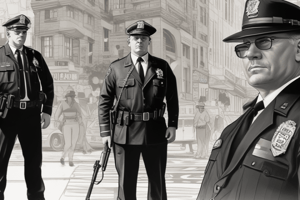Podcast
Questions and Answers
What is one major reason why police agencies are becoming less tolerant of officer misbehavior?
What is one major reason why police agencies are becoming less tolerant of officer misbehavior?
- Due to the lack of resources for officer training
- Because of the decreasing number of police officers
- To avoid litigation and protect the department and city or county government (correct)
- Because of the increasing number of police officers
What is a consequence of a corrupt officer advancing through the ranks?
What is a consequence of a corrupt officer advancing through the ranks?
- The officer will have more opportunities to corrupt other officers (correct)
- The officer will receive additional training
- The officer will be demoted
- The officer will be promoted faster
Why does the media closely watch police officers' actions?
Why does the media closely watch police officers' actions?
- To ignore the actions of police officers
- To quickly report on missteps taken by police officers (correct)
- To provide positive coverage of the police department
- To report on the personal lives of police officers
What is the result of a community perceiving a police department as corrupt?
What is the result of a community perceiving a police department as corrupt?
What is the majority of police officers today according to the text?
What is the majority of police officers today according to the text?
Why is it important for police officers to study ethics and professionalism?
Why is it important for police officers to study ethics and professionalism?
What is the consequence of a corrupt officer going undisciplined?
What is the consequence of a corrupt officer going undisciplined?
Why is personal integrity important for a law enforcement officer?
Why is personal integrity important for a law enforcement officer?
What is ethics, according to the text?
What is ethics, according to the text?
What is the purpose of agency policies?
What is the purpose of agency policies?
What is justice, according to the text?
What is justice, according to the text?
What is the purpose of a professional code of ethics?
What is the purpose of a professional code of ethics?
What are social norms, according to the text?
What are social norms, according to the text?
What is one of the consequences of corruption, according to the text?
What is one of the consequences of corruption, according to the text?
What is the purpose of prioritizing personal values, according to the text?
What is the purpose of prioritizing personal values, according to the text?
What are the six pillars of character, according to the text?
What are the six pillars of character, according to the text?
What is the primary purpose of the 'Bell' strategy in ethical decision-making?
What is the primary purpose of the 'Bell' strategy in ethical decision-making?
What is the primary difference between bribery and extortion?
What is the primary difference between bribery and extortion?
Which of the following is an example of 'denial of responsibility'?
Which of the following is an example of 'denial of responsibility'?
What is the term for the practice of giving police officers small gifts, such as coffee or food, as a form of appreciation?
What is the term for the practice of giving police officers small gifts, such as coffee or food, as a form of appreciation?
What is the 'Purpose' component of the '5 P's' of ethical power?
What is the 'Purpose' component of the '5 P's' of ethical power?
What is the 'fleeing felon' rule, and how has it evolved over time?
What is the 'fleeing felon' rule, and how has it evolved over time?
What is the goal of 'active anti-corruption programs' in preventing corruption?
What is the goal of 'active anti-corruption programs' in preventing corruption?
What is the primary goal of the L.A.C.T. decision-making framework?
What is the primary goal of the L.A.C.T. decision-making framework?
What is the 'Candle' strategy in ethical decision-making?
What is the 'Candle' strategy in ethical decision-making?
What is the term for a person, organization, or entity that may be affected by a police officer's actions?
What is the term for a person, organization, or entity that may be affected by a police officer's actions?
What is the primary benefit of having a clear 'Purpose' in ethical decision-making?
What is the primary benefit of having a clear 'Purpose' in ethical decision-making?
What is the term for a police officer who engages in corrupt activities only occasionally?
What is the term for a police officer who engages in corrupt activities only occasionally?
What is the primary characteristic of Type I corrupt police departments?
What is the primary characteristic of Type I corrupt police departments?
What is the term for the type of sexual harassment that involves making the working conditions uncomfortable for someone due to prejudice or discrimination?
What is the term for the type of sexual harassment that involves making the working conditions uncomfortable for someone due to prejudice or discrimination?
What is the primary goal of the five standards of ethical policing?
What is the primary goal of the five standards of ethical policing?
What is the purpose of the L.A.C.T. framework's 'Tell your story' component?
What is the purpose of the L.A.C.T. framework's 'Tell your story' component?
Study Notes
Justifications for Attending the Program
- Career Survival: Police agencies are becoming less tolerant of officer misbehavior, and acting inappropriately can lead to litigation and removal of problem officers.
- Career Development: As an officer progresses through the ranks, their span of contacts increases, and a corrupt officer can taint more officers and widen their scope of corruption.
- Media Coverage: The news media watches officers' actions, and missteps can lead to negative community perception and mistrust.
- Community Perception: The community's perception of the police department affects its effectiveness, and corruption can lead to mistrust, disillusionment, and hostility.
- Intra-departmental Dissension: Corruption can lead to morale suffering among good officers and create a divide within the department.
- Officer Survival: Corrupt behavior can result in serious injury or loss of life due to lack of trust and compromised integrity.
- Personal Integrity: Studying ethics and professionalism helps maintain personal integrity and upholds the oath taken as a law enforcement officer.
Definition of Ethics
- Ethics: A code of values that guides choices and actions, determining the purpose and course of life.
- Core Set of Beliefs: Ethics is about what we do, and it sets standards for behavior.
- Values: Ethics involves prioritizing values, and different values can lead to different outcomes.
Sources of Ethics
- Justice: A difficult concept to define, depending on one's point of view, and the law serves to define its limits.
- Law: Used to control individual and government behavior, relying on the ethics of those in government service.
- Agency Policy: Used to specify acceptable limits of officer conduct, defining the agency's values and community expectations.
- Professional Code of Ethics: Used to guide and restrict behavior, determining if an occupation is a profession.
- Social Norms: Developed through socialization, influencing personal values and behavior.
- Personal Values: Prioritizing values, which can conflict with social norms and agency expectations.
Pillars of Character
- Trustworthiness: Honesty, integrity, promise-keeping, and loyalty.
- Respect: Treating others with dignity and respect.
- Responsibility: Accountability, pursuit of excellence, and self-restraint.
- Justice and Fairness: Upholding justice and fairness in all actions.
- Caring: Showing empathy and compassion towards others.
- Civic Virtue and Citizenship: Demonstrating civic responsibility and good citizenship.
Standards of Ethical Policing
- Fair Access: Ensuring equal access to police services and resources.
- Public Trust: Maintaining trust between the police and the community.
- Safety and Security: Prioritizing safety and security for all individuals.
- Teamwork: Collaborating with others to achieve common goals.
- Objectivity: Making decisions based on facts and evidence, rather than personal biases.
Bribery and Extortion
- Bribery: When a citizen offers something of value to influence an officer's performance.
- Extortion: When an officer initiates an agreement, requiring a person to give them something of value in exchange for a performance.
Corrupt Departments
- Type I: Individual officers using their position for personal gain, with no organized effort.
- Type II: Pervasive unorganized corruption, with many officers acting unethically, but not organized.
- Type III: Pervasive organized corruption, with bad officers acting in an organized manner, and the police administration either actively participating or assisting passively.
Sexual Harassment
- Quid Pro Quo: Literally "this for that," where an officer demands something in exchange for a favor.
- Hostile Work Environment: Creating an uncomfortable work environment due to prejudice or discrimination.
Gratuities
- Arguments: Abuse of police authority, expression of appreciation, attempt to corrupt officers, or goodwill.
- Socialization: New officers may feel compelled to accept gratuities to avoid alienation from other officers.
- Regulating Gratuities: Important to set boundaries and guidelines for accepting gratuities.
Tennessee v. Garner
- Case: A young man was shot by an officer while attempting to escape from a burglary scene, leading to a Supreme Court rule.
- Supreme Court Rule: Deadly force can only be used to protect oneself or others, or to prevent escape of someone who poses a great risk to the community.
L.A.C.T.
- Identify Alternatives: Considering different options when faced with an ethical dilemma.
- Project the Consequences: Evaluating the potential outcomes of each alternative.
- Tell Your Story: Preparing to defend one's actions without lying.
Stakeholders
- Definition: Any person, organization, or entity affected by an officer's actions.
- Examples: Community, suspect/defendant, department, family, and police family.
Ethics Check Questions
- Is it Legal?: Ensuring actions are within the bounds of the law.
- Is it Balanced?: Evaluating the potential consequences of each alternative.
- How Will I Feel About Myself?: Considering the personal impact of one's actions.
Ethics Choice Strategies
- The Bell: Considering warning signs or "bells" when evaluating alternatives.
- The Book: Ensuring alternatives do not violate laws, policies, or rules.
- The Candle: Evaluating how actions will stand up to public scrutiny.
Excuses for Unethical Behavior
- Denial of Responsibility: Shifting blame or claiming innocence.
- Denial of Injury: Downplaying the harm caused by one's actions.
- Denial of the Victim: Dehumanizing or justifying harm to others.
- Condemnation of the Condemners: Shifting focus to others' wrongdoing.
- Appeal to "Higher Loyalties": Justifying ethical misconduct by appealing to a higher authority or group loyalty.
The 5 P's of Ethical Power
- Purpose: Understanding one's purpose and the agency's mission.
- Pride: Maintaining self-esteem and a sense of satisfaction.
- Patience: Having a clear purpose and being willing to wait for the right outcome.
- Persistence: Sticking to one's principles, even when it's not convenient.
- Perspective: Reflecting on one's actions and seeking guidance from within.
Preventing Corruption
- Sound Applicant Selection: Ensuring that new officers are of high moral character.
- Reinforcement of Core Values: Emphasizing the importance of ethics and professionalism.
- Active Anti-corruption Programs: Implementing programs to prevent and detect corruption.
Studying That Suits You
Use AI to generate personalized quizzes and flashcards to suit your learning preferences.
Description
Explore the importance of ethics and professionalism in law enforcement, including career survival and development, and the consequences of officer misbehavior.




